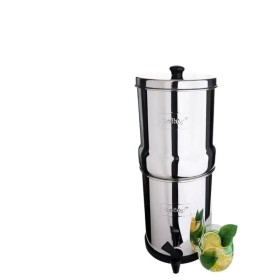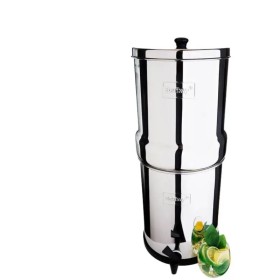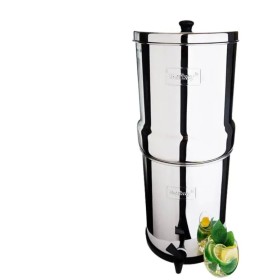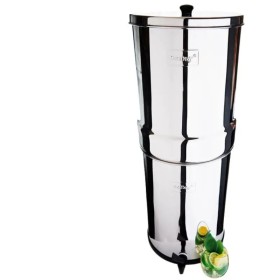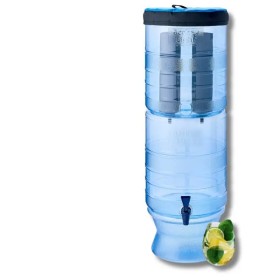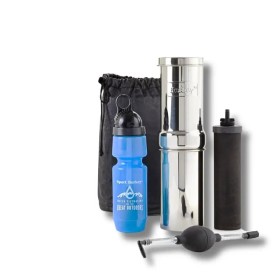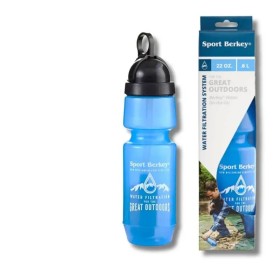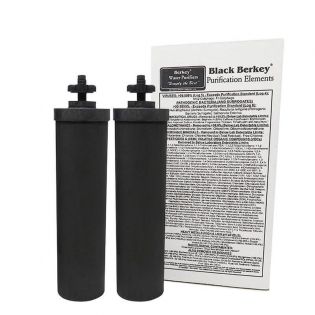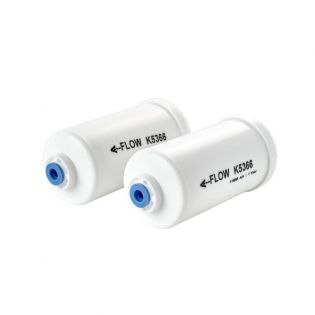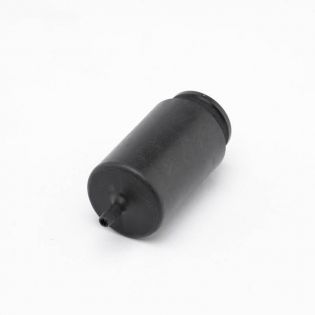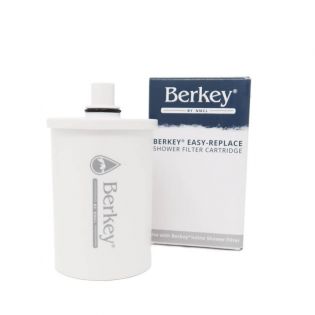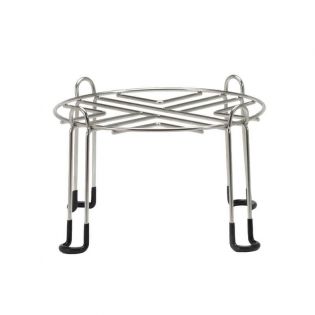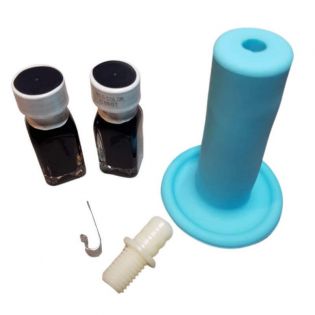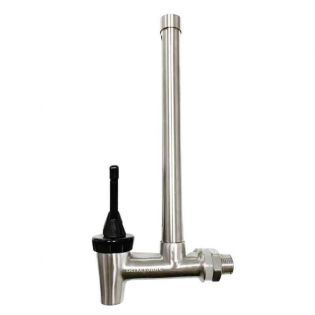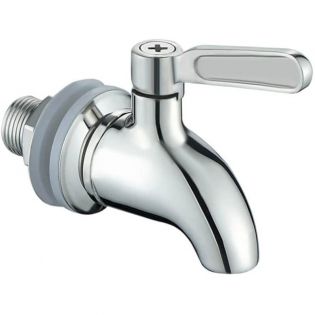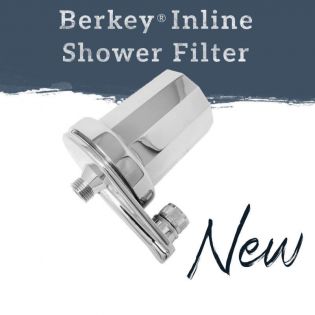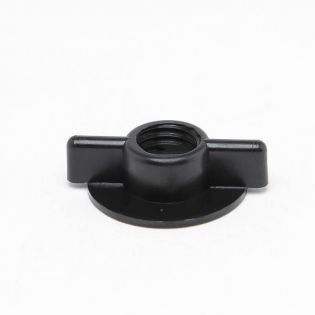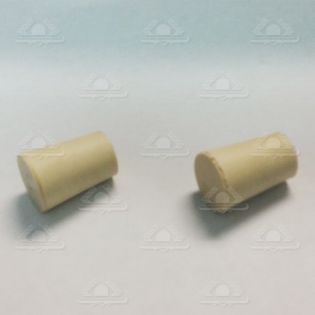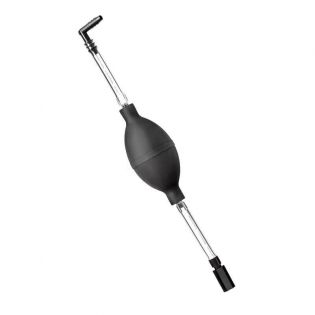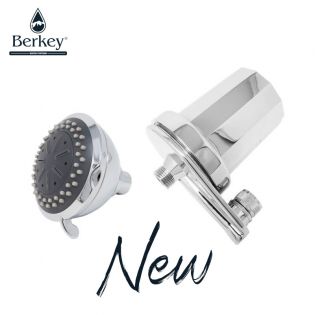Black Berkey® filter elements
The composition of the purification elements Black Berkey® used in Berkey® systems is an exclusive, patent-protected formulation based on the assembly of six different types of specific media, including very high quality activated carbon. Assembled in a very compact matrix containing millions of microscopic pores, they allow the creation of a "tortuous path" through which the water will pass but not the pollutants. Indeed, these channels are so fine that all undesirable elements are inevitably captured. Through absorption and adsorption, even submicron viruses are blocked, which other water filters cannot achieve without chemicals.
The activated carbon block is impregnated with an ion exchange resin. Activated carbon adsorbs or chemically binds to organic compounds, such as petroleum-based fuels and solvents, many pesticides and pharmaceuticals. Ion exchange resin removes many dissolved metals from water by exchanging toxic heavy metals (such as lead, mercury and cadmium) for lighter, essentially harmless metals (such as sodium, the main component of table salt). All this allows for a complete and extremely efficient filtration.
Furthermore, the manufacturer Berkey® New Millenium Concept Ltd. confirms that no graphene oxide is used in the composition of the elements.
More details can be found on the page dedicated to the operation of Berkey® water filters.
That's right! Silver is used as an anti-microbial so that each Black Berkey® element can self-sterilize. Analysis was performed by an independent laboratory to ensure that the silver used does not dissolve in the purified water and this is exactly the case. The analysis concludes, "All control samples, including stock samples, positive and negative analytical controls, and the negative control collected prior to plating gave appropriate results and were accepted. Results for the leaching control samples (effluent sample spiked with MS2 and R. terrigena and analyzed at two time points) were quite similar, suggesting that no active antimicrobial agents dissolved in the treated water."
You can check the results in this full report.
Yes! BPA is not present in any Berkey® system or any part of it. No BPA in Black Berkey® filters and no BPA in the Berkey Light® or Sport Berkey® Filter Bottle either.
Effectively, water that passes through Black Berkey® filters tends to be more basic than it was before. Its pH goes up. And that's actually a good thing... This is because pathogenic bacteria and viruses tend to thrive in acidic environments and have difficulty surviving in alkaline environments. And the higher the pH, the more alkalinity there is.
Nevertheless, it should be kept in mind that the final pH level of the treated water may depend on other factors, such as the pH level of the water before filtration.
A distinction must be made between plastics that dissolve in water and pose a health hazard and those in the form of tiny solid elements.
In the first group, and among the health-hazardous plastics that can dissolve in water, the most common are bisphenol A (BPA) and 1,1-dichloroethane (11-DCA). Good news, Black Berkey® filters allow for the removal of both of these plastics.
In addition, thanks to the filtration power that can operate in the 24 to 26 nanometer range, micro-plastics in the form of solid residues are also removed. In fact, these measure approximately 2.5 microns (2500 nanometers), much larger than the 24 nanometers of the filter.
The micro-pores that make up Black Berkey® filters are so small that they prevent micro-particles such as viruses and bacteria from getting through. Even food dyes can't get through and the filtered water becomes crystal clear!
Viruses and bacteria are ultimately trapped in these extremely fine "winding paths" (of the order of a few microns), where the much smaller water molecules (H2O) are not.
This method effectively separates contaminants from purified water.
For more information on filtration capacity, you can consult the complete test results.
Glyphosate is a herbicide and pesticide applied as a spray for agricultural purposes and mainly released into the environment through runoff water. There are countless analyses proving that the molecule is everywhere, and is found in the hair, blood and urine of an ever-growing population.
It is also increasingly present in drinking water. Black Berkey® purification elements reduce glyphosate in your water by more than 75%, exceeding laboratory-defined limits.
Read the results of analysis concerning Black Berkey® water filters and more specifically those concerning pesticides.
With the increasing consumption of drugs, more and more contaminants from drug residues are entering the natural environment and ending up in our tap water. These can include endocrine disruptors such as Bisphenol A, anti-inflammatory drugs such as naproxen, octylphenols, progesterone, hormone treatments such as HRT and many others. Fortunately, Black Berkey® water filters have the ability to filter them out to make your drinking water healthier.
You can view all the analysis resulting from tests operated by independent laboratories.
Black Berkey® filters have been tested to remove up to 99.9% of the following petroleum contaminants:
- Gasoline
- Diesel
- Crude oil
- Kerosene
- Refined oil
Find below the complete laboratory results on Black Berkey® purification elements.
Yes! Black Berkey® filtration elements have been tested to remove over 99.8% of chromium 6, because this form is the most dangerous to humans.
This is because chromium exists in different forms, some toxic, some not.
In summary, chromium comes from two distinct sources: trivalent (chromium 3+) and hexavalent (chromium 6+).
Trivalent chromium (C3) is a mineral that is beneficial to humans in trace amounts and is present in foods.
Hexavalent chromium (C6), on the other hand, is a toxic form that comes from industrial pollution: use in metal coatings (such as stainless steel), in pigments and dyes, in wood preservatives and in tanning processes.
Not all filters are created equal, and the removal of heavy metals does not necessarily mean that chromium 6 is removed. The Black Berkey® filter, on the other hand, is effective against this source of pollution as demonstrated by these test results.
Giardiasis (or giardiosis) and cryptosporidiosis are intestinal infections caused by protozoan parasites (giardia lamblia and cryptosporidium parvum). While giardiasis is often mild, cryptosporidiosis is a serious intestinal disease. These conditions are often caused by ingesting water or food contaminated with the feces of infected animals or humans.
Symptoms of giardiasis and cryptosporidiosis may include diarrhea, gas, nausea and cramps. Parasites are typically found in outdoor water sources such as lakes, streams and pools.
Black Berkey® purification elements remove cryptosporidium by over 99.996% and have been tested to reduce Giardia cysts by over 99.994% as confirmed by test results.
Leptospirosis is a serious infection that is contracted through direct contact with the urine of an infected animal, or through ingestion of infected water or food. It is a widespread disease carried by a bacterium belonging to the genus Leptospira.
Most cases result in flu-like symptoms, but some extreme cases can be fatal.
Black Berkey® purification elements have been tested to reduce Leptospira bacteria by more than 99.6% based on contamination levels well above those encountered in nature.
Find out more about leptospirosis below.
Read the results of tests conducted to prove the effectiveness of Black Berkey® filters against leptospirosis.
Water can contain a certain number of minerals in the form of dissolved ions, negatively charged (anions), or positively charged (cations). This ionic form is assimilated by the human body. These minerals include calcium (Ca++), carbonates (CO3--), bicarbonates (HCO3-), chlorides (Cl-), potassium (K+), magnesium (Mg++), sodium (Na+), nitrates (NO3-) and sulfates (SO4--).
The media contained in Black Berkey® purification elements is not designed to remove these beneficial minerals (in ionic form) from the water. They can certainly be reduced if they are highly concentrated, but most will pass through the filters and into your filtered water.
If you still want to add additional minerals to your water, we recommend using liquid additives and incorporating them into the lower chamber of your Berkey® system so that their concentration is not reduced.
Finally, we are often asked what the dry residue rate is after filtration. The answer is simple: if you understand that the mineral concentration is the same before and after filtration, the dry residue level is also the same and depends entirely on the water you are filtering.
Black Berkey® filters come standard on Berkey® purification systems, the market leader in gravity-fed water purifiers. Each element is designed to purify approximately 11,300 liters of water before needing to be replaced. A pair of these elements in a Berkey® water purifier will purify approximately 22,600 liters of water before replacement is recommended. Black Berkey® purification elements are sold in sets of two and can be used to upgrade most gravity-fed water filtration systems. They are cleanable and self-sterilizing. They come with a 2-year commensurate warranty.
Also find installation and operating instructions for Black Berkey® purification elements and a video explaining how to prime Black Berkey® water filters.
To facilitate the priming of Black Berkey® filters, Berkey® has created a priming pump. See detailed information about the Black Berkey Primer® pump.
Black Berkey Primer™ is a hand pump that makes it easy to prime Black Berkey® filter elements without the need for faucet pressure or when there is not enough room under the faucet to easily prime filters.
Priming Black Berkey® purification elements is a must in order to flush out air and saturate the filters with water before use.
The Primer™ pump also allows the Black Berkey® purification elements to be purged with air in order to clean the pores in the filter wall if necessary, but also to dry the filters in the event of long-term storage (see information on the storage of Black Berkey® filters on this subject).
The Primer pump therefore allows:
1- Remove debris that may accumulate in the filter pores during use,
2- Reduce the time and effort required to dry the filters before storing them,
3- Facilitate priming of the elements when water pressure is not accessible or when there is little space under the faucet, for example with a small sink.
The Black Berkey Primer™ pump is specifically designed for use with Black Berkey® purification elements.
Find instructions for using the Black Berkey Primer™ pump. To supplement this information, you can watch a video on how to use the Black Berkey Primer™.
Black Berkey® water filters do not necessarily need to be cleaned every time you clean your Berkey® water purifier. Nevertheless, this is to be weighed against the quality of your water. If you live in an area where the water is much dirtier than normal, it may require more frequent cleaning of the elements to remove debris that can clog the pores of your Black Berkey® purification elements.
Regarding the frequency of filter cleaning, it can be assumed that it is necessary to do so when you notice that the flow rate starts to decrease considerably.
For hard water, cleaning should be done every month. In other cases, set a limit of 6 months maximum, so as not to reach the point where the filters become completely clogged.
How to clean your filters?
1. Start by emptying and disassembling the Black Berkey® Purification Elements from the Berkey® System. Then use a cleaning pad similar to a Scotch Brite pad or a stiff toothbrush and gently scrub the outside of the Black Berkey® Purification Elements under running (and cold) water.
2. Reboot the filters.
3. Reassemble the Black Berkey® purification elements in your Berkey® system and refill the upper chamber.
Each Black Berkey® water filter is designed to filter and purify approximately 11,350 liters of water before needing to be replaced. The pair of elements in all Berkey® systems (except the Go Berkey®, which has only one) will filter and purify approximately 22,700 liters of water before needing to be changed.
That's about 10 years of use for two Black Berkey® filters used in a system for a family of four, each consuming 1.5 liters of water per day.
Sample calculation to determine when to change the filters on a Big Berkey® system:
The Big Berkey® has a capacity of 8.5 liters. If the system is filled completely once a day, the calculation would be: 22700 / 8.5 / 365 = 7.3 years
This formula can be adapted to your model and daily filling habits to determine how often you should consider changing your filters.
Important note: the theoretical life span may vary depending on the water you are filtering. Not all water is equally loaded. This theoretical life is therefore not universal and is totally dependent on the formulation of each type of water and the maintenance given to the filters.
You can also apply this formula to PF-2 filters starting with the theoretical filtration capacity of 3800 liters.
1- If you have already used your filters
The storage method will depend on how long the Black Berkey® water filters will not be used:
- If the amount of time they will not be used is less than 3 days, there is nothing special to do.
- If the filters will not be used for more than 3 days but less than 15 days and you want to avoid the re-booting process, remove them from the system, place them in a sealed plastic bag and then place the filters in the refrigerator, making sure they do not freeze. This will allow the filters to remain saturated with water and prevent re-priming. If you find that the filters are running slower than usual when they are restarted, re-prime them until water drips from the outside of the filter.
- For longer term storage, we recommend drying and sealing the filters. The key is to make sure they are completely dry before storing them, to avoid bacterial growth. One way to dry your filters is to leave them on a windowsill for one to three days and let them dry out completely. We also offer a priming and purging tool. This tool is called the Black Berkey Primer™. The advantage of purging Black Berkey® purification elements is that they dry very quickly. Once the filters are dry, place them in a tightly sealed plastic bag. Black Berkey® filters are extremely powerful and can absorb odors and smoke from the air. When you turn them back on, clean them by scrubbing the outside with a Scotch-Brite® pad or a stiff brush. Then re-boot the filters manually or with Black Berkey Primer™ before putting them back in the system.
* Please note that the above storage methods apply to Black Berkey® purification elements only. See below for PF-2 filters.
2- If you have never used your elements
If the elements are unopened and still in their original packaging, be careful not to store them in an area with strong odors, such as a laundry room or garage. The elements contain activated carbon, among other things, which allows them to absorb odors from the room in which they are stored. For example, avoid storing them near highly scented items such as soap or washing powder.
In theory, the shelf life of Black Berkey® purification elements is unlimited.
When storing the stainless steel chambers of your Berkey® system, it is best to drain them thoroughly, as stagnant water can become loaded with bacteria. We recommend that you wash your Berkey® system with soapy water before letting it dry.
There are two cases to consider:
1- If you have just purchased your Berkey® water purifier and the filters are new, the problem is usually due to high water stress. This prevents air from being purged from the micropores of your Black Berkey® water filters. It is imperative that your filter elements be purged of this air to allow water to pass through them. A beige priming washer / blue silicone valve and priming instructions are included with Black Berkey® elements. Remove your filters, prime them, then reinstall them in your unit. This should solve the slow flow problem.
2- If the flow rate slows significantly during the use of your Berkey® system, the problem can be easily solved by cleaning the elements again. Turbidity and sediment clogging of the micropores are usually the cause of this problem. Simply remove the elements from your system and scrub the outside of each element with a Scotch Brite® pad or stiff toothbrush. Scrub one part of the element until you see some black appear on the sponge or toothbrush, then move to another part until you have gone around each element. This simple process should only take a few minutes. Reboot each element, then reinstall them in your device. Your flow should be restored.
WARNING: Never use soap or detergent.
The exclusive design of Black Berkey® filtration and purification elements compensates for the incredibly small pore size by using an exponentially larger number of micro-pores in each element. This is why Black Berkey® water filters produce approximately 8 times more water per hour than other competitive elements. Although a number of the surface pores can become clogged with contaminants, it is very difficult to submerge all of the pores and thus clog the filter. In the end, we may see a slowing of the filtration rate, but never a total clogging. If this happens, the filter can be cleaned by simply brushing the outside of the element with a ScotchBrite® pad or toothbrush. This will remove particles that clog the surface pores of the filter.
In conclusion, even though the filters have very fine micro-pores, the filter will not clog prematurely.
The filtration capacity of Black Berkey® water filters is determined by their effectiveness in reducing heavy metals. After this volume of filtered water, it is possible that some of these heavy metals may pass through the filter. However, their effectiveness on other pollutants is still operational well beyond the 11,300 liters.
Nevertheless, to be safe, it is better to keep this theoretical capacity and change the filters once this volume of water is reached.
It all depends on the technique used. CO2 or magnetic softeners, for example, produce water that is normally drinkable (to be confirmed by the manufacturer) and is not a problem with Berkey® systems.
But the most commonly used softeners work with ion exchangers that convert calcium and magnesium, which are responsible for the accumulation of limescale, into sodium. Using these softeners produces soft but salty water...
Black Berkey® water filters are designed to remove a very large number of pollutants as specified in test results from an independent laboratory. However, they do not remove the mineral salts initially present in the water and preserve them for the benefit of our body. The salts used to soften the water in your softener, and present in large quantities, will not be filtered by the Black Berkey® filtration element and will end up in your drinking water. Unlike natural mineral salts, they are highly concentrated and should not be consumed.
We therefore advise against using water softened at the outlet of a softener to supply your Berkey® purifier.
Non-recommended use will invalidate the filter warranty.
Note: Some systems are equipped with a bypass to remove water from the system before it goes through the softener. In this case, this water can be used without any problem with the Berkey® water purification systems.
The washers are made of food-grade neoprene rubber. In addition, none of the components used in Berkey® systems contain materials that are hazardous to health. For example, there is no trace of BPA in Berkey®.
As for the washers, keep in mind that they never stay in contact with filtered or purified water.
According to the World Health Organization, the following sources are not recommended as drinking water:
- Water from radiator circuits, hot water boilers (home heating systems)
- Water from the toilet bowl or cistern
- Water in waterbeds
- Water from swimming pools and spas
The chemicals and contaminants commonly found in pools are varied and mostly toxic: pH+, pH-, alkalinity adjustment (bicarbonate of soda, muriatic acid, sodium bisulfate), calcium hardness increase, chlorine, bromide, biguanide, cyanuric acid, ammonia, bacteria and other pathogens, algae, insects and animal waste...
The presence and concentrations of these chemical contaminants depend on several factors, including the type of pool, the type and dosage of disinfectants used, the bather load, temperature and pH.
Although Black Berkey® purification elements have been rigorously tested by independent third-party laboratories for the removal or reduction of a wide range of contaminants (herbicides, heavy metals, chlorine, chloramine, pathogenic bacteria, parasites, pesticides, perfluorinated acid compounds, petroleum products pharmaceutical products, radiological products, trihalomethanes, viruses and volatile organic compounds...) and even though according to the data of these tests, the concentration of chlorine is reduced by more than 99.9%, we believe that it is not recommended to filter the pool water with Berkey® systems and to drink it for regular consumption.
This water may contain contaminants or chemicals other than those tested and for which we have no factual data as to their dangerousness.
Limestone is in fact a form of calcium called calcium carbonate. It is rich in calcium but also in dissolved magnesium (mineral salts essential to health). The presence of calcium in water is natural. It comes from the soil that the water has passed through before being pumped and made drinkable. Calcium is a natural element and tap water can provide up to 25% of daily calcium intake. So why remove it?
Well, Berkey® filters do not remove it! The mineral salts are therefore present in the filtered water, for your well-being, unlike the pollutants, which are filtered out.
If, however, deposits accumulate in the tanks due to very hard water, it is sufficient to clean them from time to time with white vinegar and lukewarm water, for example. The filters can be scrubbed on the outside with a soft brush or Scotch-Brite® to clean them and remove any clogged pores.
The Black Berkey® water filters used in Berkey® purification systems are fully capable of filtering rainwater.
However, certain precautions must be taken. For example, make sure that there is no contamination by a specific pollutant that would be missing from the test results performed by Berkey®. Also, be careful to minimize contact of the water with any animal feces (birds, squirrels, etc.) or chemicals used on the roof. The water should be pre-filtered before entering the purifier to avoid excessive suspended solids, which would clog the filters more quickly and require frequent cleaning.
Some of our customers have built rainwater filtration systems with a multi-stage collection process (up to 5 for some systems) and equipped with several Black Berkey® filter elements (from 4 to 8). The water is filtered in successive stages and stored in suitable containers.
Even if the Black Berkey® elements are water purifiers, it is nevertheless recommended, in this type of use and if for example a high contamination by E-Coli is suspected, to add a few drops of disinfectant (unscented) based on chlorine, at the first stage of filtration.
See also this topic on filtering water from a source other than the tap.
What are the estrogenic compounds?
Estrogenic compounds are part of a larger class of chemicals called endocrine disruptors, chemicals capable of altering the hormonal and homeostatic system that allows an organism - such as a human or other animal - to communicate with and respond to its environment.
What types of estrogens are found in drinking water?
The main types of estrogens in our water supply include estrone, estradiol, estriol, and especially synthetic ethinyl estradiol (EE) from drugs such as the birth control pill. Ethinyl estradiol, or ethinyl estradiol, is the most widely used orally active estrogen in the world... But most other chemicals in wastewater effluent have an estrogenic effect on our bodies. Such as dihydrofolliculin, octylphenol, nonylphenol, polyethoxylates, trihalomethanes and bisphenol A.
Berkey® Filter Efficiency
Generally speaking, activated carbon filters can remove a wide range of different endocrine disruptors, including steroidal estrogens and many estrogenic substances such as trihalomethanes (or THMs, a group of chemicals that can contaminate drinking water, formed when the chlorine used to disinfect water reacts with natural organic matter in the water: vegetation, dead leaves, etc.). Black Berkey® purification elements have been successfully tested for the reduction of progesterone, octylphenol, nonylphenol, THMs and BPA (see test results). And, although estrogen was not specifically tested, we can estimate that this pollutant is also removed from the water, based on reduction tests conducted on similar endocrine disruptors.
A conductivity meter or TDS pen can be purchased for a few euros on the main online sales sites. These meters are misleadingly presented as water quality testers, whereas they only allow to show the more or less good conductivity of the water.
The conductivity of water is directly proportional to the quantity of solids dissolved in the water, i.e. mineral salts in their ionic form (and not organic matter or various pollutants). Thus, the higher the concentration of dissolved minerals and trace elements, the higher the conductivity.
These devices do not detect the presence of pollutants or contaminants.
The concentration indicated by these tools before filtration therefore corresponds solely to the content of minerals dissolved in ionic form in your water.
The fact of having the same measurement before and after filtration means that the mineral salts have not been retained, which is the very principle of Berkey® filtration. This measurement in no way questions the effectiveness of the Black Berkey® filters and is not evidence that your system is malfunctioning.
If your measurement is higher after filtration, it means that the filters have not been cleaned properly and that some residual dust remains after the filters have been machined. It will tend to decrease over time.
Congratulations! That means your Black Berkey® filters have been primed perfectly!
The water flows in a trickle as soon as you fill the top tank. It is the weight of the water column that forces the water through the filters. Once the water column is smaller (between the last third and half), the water flows in a fast drip.
The strength and performance of Black Berkey® filters is the microchannels that take a tortuous path so that the water is in contact with the filter over a long distance, but because there are millions of them, the water is ultimately filtered very quickly.
In general, a full tank is filtered in 45 minutes, give or take 10 minutes. If this is not the case, it means that your filters are not primed properly. You must then redo the priming by following the recommendations provided in your manual.
If you find that filtration is really fast (10 to 20 minutes), again, don't panic! The filtration speed indicated by the manufacturer is an average and a very fast filtration does not mean that the filters have failed. First of all, check that your black gaskets are properly installed on the upper tank side and that the blocking plugs are properly in place and tightened (except for the Travel model). Also, make sure the wing nuts are tight enough (but not too tight). After that, when the water is being filtered, check, by lifting the top tank, that the water is flowing only through the end of the threaded rods of the Black Berkey® filters. Finally, if after all these verifications made and validated by you, if the filtration is still as fast, you can do a red dye test with the recommendations indicated on your instructions or in our FAQ. This is the ultimate step that will determine if your filters are performing well or not.

